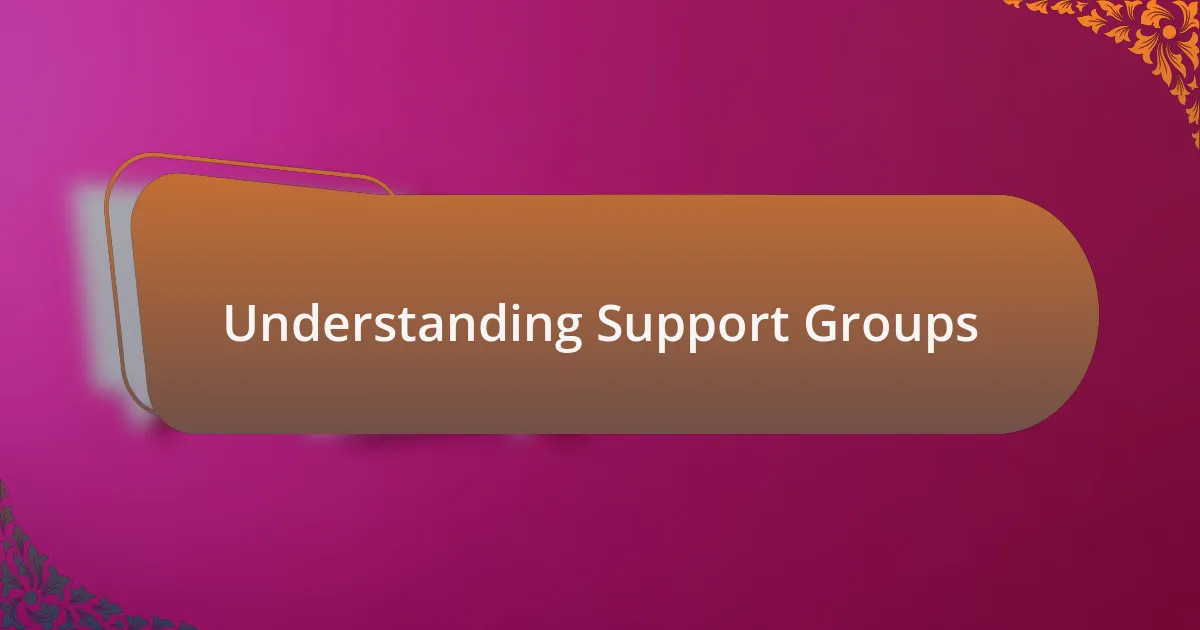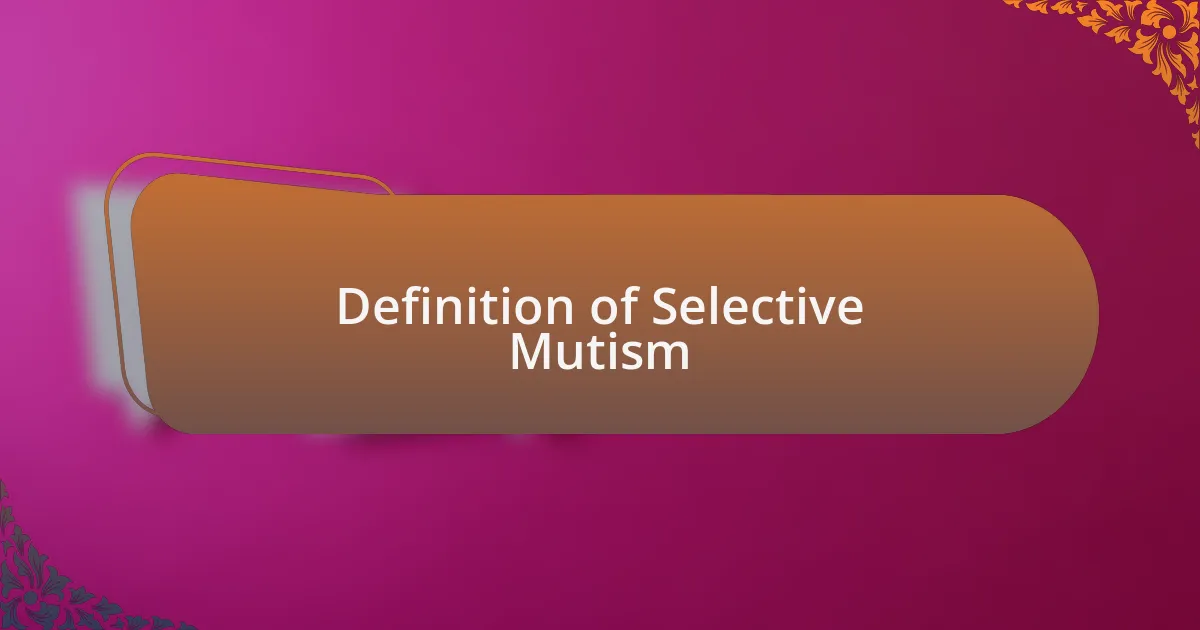Key takeaways:
- Support groups provide a safe space for individuals with selective mutism to share experiences and coping strategies, fostering connection and empowerment.
- Selective mutism is characterized by an inability to speak in certain social situations due to anxiety, impacting social interactions and academic performance.
- Types of support groups include peer-led, therapist-led, and online formats, each offering unique benefits in fostering community and understanding.
- Participation in support groups has transformative effects, providing validation, inspiration, and encouragement to face personal challenges and take action.

Understanding Support Groups
Support groups serve as a vital resource for individuals navigating the challenges of selective mutism. From my own experience, attending my first support group felt like stepping into a safe haven. I remember feeling a mix of nervousness and hope; a space where others understood the weight of silence.
It’s fascinating how these groups foster connections that can build confidence over time. I recall a poignant moment when a fellow member shared their victories and setbacks; it reminded me that we are not alone in our journeys. Have you ever felt the relief of knowing someone else shares your struggles? That shared understanding can be incredibly empowering.
Moreover, the insights gained from diverse experiences often bring fresh perspectives on how to approach selective mutism. I often find myself reflecting on the different coping strategies discussed at meetings. Isn’t it enlightening how a simple conversation can spark new ideas? Support groups truly emphasize the importance of community in personal growth and healing.

Definition of Selective Mutism
Selective mutism is characterized by a consistent inability to speak in specific social situations, despite having the capacity to communicate in more comfortable settings, like at home. I remember the first time I assessed my situation; the profound contrast between my voice at home and my silence at school was jarring. It made me question the nature of my fear—was it the judgment of others or simply the weight of expectation?
This disorder often manifests during childhood, and it can significantly impact social interactions and academic performance. Reflecting on my younger years, I can distinctly recall the palpable tension in those moments when my teacher called on me; the pressure felt like a thousand eyes fixated on me, unaware of the panic building inside. Have you ever been in a situation where everyone expects you to speak, yet your mind feels completely blank?
In essence, selective mutism isn’t merely an absence of speech; it’s a complex interplay of anxiety and social context. I found it enlightening to participate in discussions that highlighted how, for many, silence stems from deep-rooted fears rather than a voluntary choice. It prompts me to wonder: how much do we misunderstand those who face similar struggles without even realizing the battles they silently endure?

Benefits of Support Groups
Joining a support group can be a transformative experience. I still remember the first time I sat in a circle with others who shared my challenges; it felt like a weight lifted off my shoulders. There’s something undeniably powerful about connecting with people who truly understand the struggle. Have you ever felt that instant sense of belonging when you realize you’re not alone in your fight?
One of the most significant benefits I’ve found is the exchange of coping strategies. When someone shares how they navigated a tough situation or overcame a hurdle, it sparks new ideas in me. I often thought, “Why didn’t I think of that?” This kind of collective wisdom can be life-changing, guiding us toward practical solutions that we might not discover on our own.
Additionally, support groups foster an environment of compassion and empathy. I recall a poignant moment when a member bravely shared their story of setbacks and triumphs; it reminded me of my own journey. In those moments, I felt seen and validated. Isn’t it comforting to know there’s a safe space where we can express our emotions freely, without fear of judgment?

Types of Support Groups
Support groups can take various forms, each tailored to meet specific needs. For instance, a peer-led group offers a unique dynamic where members share their experiences and insights without a professional leading the conversation. I remember attending one of these sessions where the camaraderie felt almost palpable; it was reassuring to realize that everyone was there purely for support, just as I was.
Another type is the therapist-led group, which combines professional guidance with peer support. I once participated in such a group and found that having a trained facilitator helped steer the conversation and ensure that member contributions were constructive. There were times when the therapist would pause and encourage us to share, prompting deep discussions that often led to breakthroughs I didn’t anticipate. Isn’t it fascinating how different approaches can unlock new perspectives on our experiences?
Finally, online support groups have gained significant traction, especially for those facing geographical or social barriers. I have found myself leaning into virtual meetings during times when in-person gatherings felt overwhelming. The convenience alone was a game-changer, allowing me to connect with others who face similar challenges without the pressure of being physically present. Can you imagine how liberating it feels to know that support is just a click away?

How Support Groups Helped Me
Participating in support groups truly transformed my journey with selective mutism. I distinctly recall one particular meeting where we shared our fears about new situations. Listening to others articulate emotions I struggled to express gave me a sense of validation, as if I wasn’t navigating this lonely path alone. Have you ever felt that euphoric release when you realize someone else truly understands your struggles?
Attending these groups often felt like finding a safe haven. There were days when I felt overwhelmed by anxiety, yet being surrounded by individuals who “got it” made all the difference. I vividly remember an exercise where we practiced speaking up in a supportive environment, and slowly but surely, I found my voice. What’s more empowering than knowing that the awkwardness we sometimes feel is shared by others?
I also appreciated the diversity of experiences shared within the group. One member’s story about confronting a challenging social situation inspired me to step out of my comfort zone in a way I hadn’t considered. The encouragement from my peers pushed me to try new strategies as I navigated daily interactions. Isn’t it remarkable how a simple story can spark that motivation in each of us?